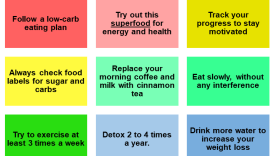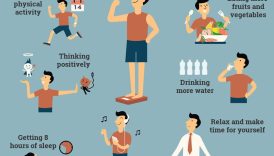Empowering Your Journey to a Long and Vibrant Life

In today’s fast-paced world, taking care of one’s health can sometimes feel like an uphill battle. With the countless responsibilities at work, home, and in our social lives, prioritizing physical and mental well-being may often take a back seat. However, the importance of a holistic approach to health cannot be overstated. By focusing on physical fitness, mental well-being, solid social connections, and quality sleep, individuals can foster a lifestyle that promotes overall health and happiness.
- Empowering Your Journey to a Long and Vibrant Life
- The Health Connection
- Importance of Physical Health
- Regular Exercise
- Balanced Diet
- Mental Well-being
- Mindfulness Practices
- Stress Management Techniques
- Social Connections
- Building Strong Relationships
- Community Involvement
- Quality Sleep
- Sleep Hygiene Tips
- Creating a Relaxing Bedtime Routine
The Health Connection
Consider this: When Sarah, a busy marketing manager, started feeling fatigued and overwhelmed, she realized she had been neglecting her health. By making small changes—like incorporating regular exercise and tuning into her diet—she noticed improved energy levels and mood. This personal story reflects a common struggle and marks the essence of why health matters. Effective health management can be summarized through four pillars:
- Physical Health: Regular exercise and a balanced diet are crucial for maintaining not just physical health but also mental clarity.
- Mental Well-being: Practices like mindfulness and effective stress management techniques play a significant role in how individuals handle everyday challenges.
- Social Connections: Our relationships with friends and family provide essential support systems that enhance our mental health.
- Quality Sleep: Never underestimate the power of a good night’s rest; optimal sleep hygiene and a calming bedtime routine can profoundly impact daily functioning.
These aspects form the foundation of a healthier lifestyle and create a ripple effect, transforming various life dimensions. Throughout this article, readers will discover effective techniques and practical tips guided by these health principles. By emphasizing these areas, anyone can take actionable steps to improve their overall well-being while enjoying the journey towards a healthier life. Whether it’s through building relationships or focusing on nutrition, each step taken is a step towards a brighter future.
Importance of Physical Health
After understanding the foundational role of health in our lives, let’s delve into two crucial aspects that form the backbone of physical health: regular exercise and a balanced diet. These elements are interlinked and play a profound role in enhancing not only physical fitness but also mental clarity and emotional stability.
Regular Exercise
Exercise is often hailed as a miracle drug, and rightfully so! From boosting energy levels to improving mood, the benefits of making movement a regular part of daily life are vast. For instance, when John, a software engineer, decided to swap his sedentary lifestyle for after-work jogs and weekend hikes, he noticed a significant uptick in his productivity and an overall sense of vitality. Here are some key benefits of regular exercise:
- Boosts Mood: Physical activity releases endorphins, known as the “feel-good” hormones, which can reduce feelings of stress and anxiety.
- Improves Cardiovascular Health: Regular exercise strengthens the heart and improves circulation, reducing the risk of heart disease.
- Enhances Sleep Quality: Engaging in physical activity can help regulate sleep patterns, making it easier to enjoy restful, restorative sleep.
To incorporate exercise into your life, aim for:
- At least 150 minutes of moderate aerobic activity each week.
- Resistance training twice a week to strengthen muscles.
Balanced Diet
Alongside exercise, maintaining a balanced diet is another pillar of physical health. Eating a variety of foods ensures the body receives essential nutrients needed for optimal functioning. For example, when Lisa, a college student, shifted her meals from convenient fast food to nutritious home-cooked options, she not only felt more energetic but also saw improvements in her focus and concentration. Consider these tips for achieving a balanced diet:
- Emphasize Fruits and Vegetables: Aim for at least five servings a day.
- Incorporate Whole Grains: Choose whole grain bread, pasta, and brown rice over their white counterparts.
- Limit Added Sugars and Saturated Fats: Keep snacks to a minimum and focus on healthy fats like nuts and avocados.
By prioritizing regular exercise and a balanced diet, individuals set the stage for a healthier lifestyle, paving the way for better physical and mental well-being in the long run. Together, these habits are transformative and prioritize one’s overall health.
Mental Well-being
Having explored the importance of physical health, it is essential to shift our focus to another vital aspect: mental well-being. Just as physical well-being enhances our quality of life, nurturing mental health is equally crucial for achieving balance and happiness. Two powerful tools in this regard are mindfulness practices and stress management techniques.
Mindfulness Practices
Mindfulness is more than just a buzzword; it’s a transformative practice that encourages living in the present moment and being fully aware of one’s thoughts and feelings. When Emily, a busy teacher juggling her responsibilities, began practicing mindfulness, she realized how it significantly decreased her anxiety. Setting aside just ten minutes a day for mindfulness exercises helped her navigate her busy life with more ease. Incorporating mindfulness into daily routines can include:
- Meditation: Simple breathing exercises or guided meditation apps can ground you and bring clarity.
- Mindful Eating: Taking the time to savor each bite can enhance your appreciation for food and improve digestion.
- Nature Walks: Engaging with nature while focusing on the sights, sounds, and smells around encourages a sense of peace.
The beauty of mindfulness is that it can be tailored to fit any lifestyle, providing a quick escape from the chaos of daily life.
Stress Management Techniques
While mindfulness helps anchor the mind, stress management techniques equip individuals to handle life’s challenges more effectively. For instance, when Mark, an advertising executive, learned various stress-relief methods, he discovered how to better cope with tight deadlines and unexpected changes. Here are some effective stress management techniques:
- Deep Breathing: Engaging in deep breathing exercises can help lower heart rate and reduce feelings of anxiety.
- Time Management: Organizing tasks through to-do lists helps prioritize and lessen overwhelm.
- Physical Activity: Similar to exercise, even a brisk walk can serve as a quick stress reliever.
Adopting a combination of mindfulness practices and stress management techniques allows individuals to foster resilience and promote a healthier mindset. When embraced, these practices not only enhance mental well-being but also enrich the overall quality of life, enabling individuals to thrive in both personal and professional arenas.
Social Connections
Having established the significance of mental well-being, it is imperative to recognize the role social connections play in enhancing our overall health. Humans are inherently social creatures, and strong relationships, along with community involvement, are not just beneficial but essential for leading a fulfilled life.
Building Strong Relationships
Forming strong relationships can be incredibly rewarding. When Sophia, a retiree who moved to a new city, made it a point to connect with neighbors and join local clubs, she experienced a wave of companionship and support that enriched her life. Building relationships isn’t solely about quantity but rather the quality and depth of connections that matter. Here are some tips for nurturing strong relationships:
- Effective Communication: Open conversations can deepen bonds. Listening intently fosters trust and understanding.
- Be Present: Investing time in friends and family, whether through a phone call, a lunch date, or a simple text, reinforces the connection.
- Share Experiences: Engaging in shared activities, like classes or sports, creates lasting memories that fortify relationships.
Remember, it’s not just about maintaining existing relationships, but also about forging new ones. Being open to meeting new people can lead to unexpected friendships.
Community Involvement
In addition to personal relationships, being involved in the community is a fantastic way to contribute and find connection. When Alex volunteered at a local food bank, he discovered not only a sense of purpose but also met many like-minded individuals who shared his values. Community involvement fosters a sense of belonging and brings diverse groups together. Consider these ways to engage with your community:
- Volunteer Your Time: Whether at a local charity, animal shelter, or community garden, giving back enriches your life and others’.
- Attend Local Events: Participating in town meetings, festivals, or fitness classes creates opportunities to meet new people.
- Join Clubs or Groups: Many hobbies have associated clubs that provide a platform for bonding over shared interests.
Fostering social connections through strong relationships and community involvement is vital for holistic health. As individuals build these connections, they not only enhance their own well-being but also contribute to a larger network of support within society. By investing in others, we pave the way for richer, more meaningful lives.
Quality Sleep
Having explored the importance of social connections, let’s shift our focus to another essential pillar of overall health: quality sleep. While it might be easy to overlook, sleep plays a critical role in maintaining both physical and mental well-being. A restful night’s sleep can enhance mood, improve cognitive functions, and even boost the immune system.
Sleep Hygiene Tips
Achieving quality sleep often starts with establishing good sleep hygiene habits. When Jessica, a graphic designer, noticed her late-night screen time was affecting her rest, she made deliberate changes that resulted in much better sleep quality. Here are some foundational tips for enhancing sleep hygiene:
- Consistency is Key: Going to bed and waking up at the same time each day helps regulate your body’s internal clock.
- Limit Screen Time: The blue light from phones and computers can interfere with melatonin production. Aim to turn off screens at least an hour before bed.
- Create a Comfortable Sleep Environment: Ensure your bedroom is cool, dark, and quiet. Investing in a comfortable mattress and pillows can also make a significant difference.
- Watch What You Consume: Avoid large meals, caffeine, and alcohol close to bedtime as they can disrupt sleep.
Implementing these sleep hygiene practices can significantly contribute to achieving deeper, more restorative sleep.
Creating a Relaxing Bedtime Routine
In addition to good sleep hygiene, cultivating a calming bedtime routine can signal to your body that it’s time to wind down. When Tom, a busy project manager, incorporated a structured routine into his evenings, he found it much easier to transition to sleep. Here’s how you can create your own relaxing bedtime routine:
- Wind Down an Hour Before Bed: Dedicate this time to calming activities such as reading, taking a warm bath, or practicing relaxation exercises.
- Incorporate Mindfulness: Spend a few minutes practicing meditation or deep breathing exercises to let go of daily stress.
- Limit Stimulating Activities: Avoid intense workouts or mentally challenging tasks right before bed.
- Use Relaxing Scents: Consider incorporating essential oils like lavender or chamomile, which are known for their calming properties.
By prioritizing both quality sleep and a relaxing bedtime routine, individuals can experience a rejuvenating night’s rest that sets a positive tone for the following day. Quality sleep isn’t just a luxury; it is essential for achieving a harmonious balance in life, enhancing both physical health and mental well-being. Embracing these practices creates room for thriving, energized days ahead.




